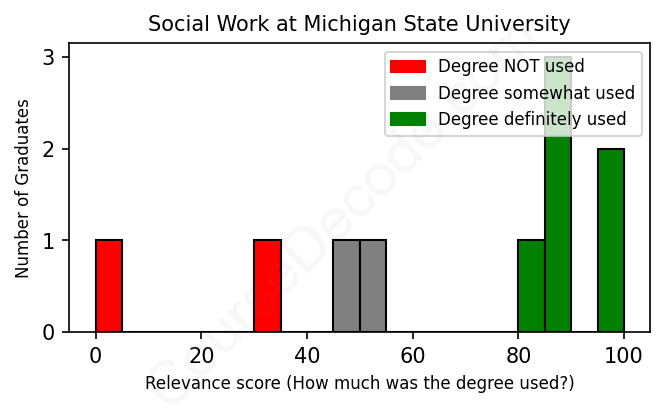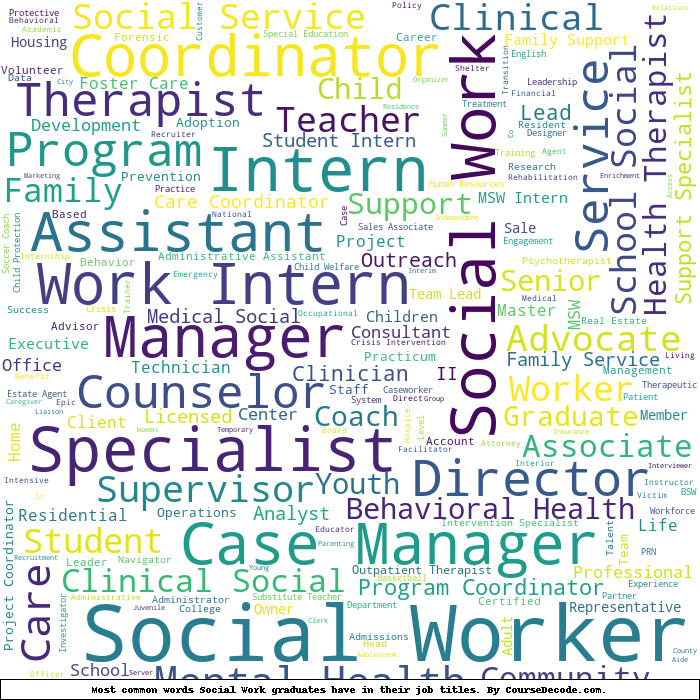
First, some facts. Of the Social Work graduates from Michigan State University we've analyzed , here's how many have used (or NOT used) their degree in their career:

These are estimates based on AI analysis of 10 LinkedIn profiles (see below).
The verdict? On par with the average. Overall, with an average relevance score of 67%, Social Work graduates from Michigan State University have about the same likelihood of finding work in this field as the average graduate across all fields:
And for comparison, here's the chart for all profiles we've looked at across all degrees.
Also, after graduating, 70% of these graduates have pursued further education other than another Bachelor's degree (such as a Masters degree or other), compared to the average across all profiles of 35%. This suggests you may need more than just a Bachelors degree to be competitive as a Social Work graduate.
See the details:
|
Relevance score: 46% We think this person has gone into a career only somewhat relevant to their degree. We think this person has gone into a career only somewhat relevant to their degree.
DEGREE INFOGraduated in 2010 from Michigan State University with a Bachelor's Degree in Social Work. Also pursued further education since (see below). JOB HISTORY SINCE GRADUATIONLaw Clerk The Sam Bernstein Law Firm Jan 2013 - May 2013 Law Clerk  Haas & Goldstein, PC Sep 2013 - Mar 2014 Attorney  Joseph Kallabat & Associates, PC Apr 2014 - Present FURTHER DEGREES DONE SINCE GRADUATINGJuris Doctor (J.D.)University of Detroit Mercy School of Law 2010 - 2013 ABOUTNo information provided. |
The top 10 most common jobs done by the graduates we've analyzed (ranked most common to least) are:
When looking at the career paths of graduates from Michigan State University with a degree in Social Work, there’s a mix of roles that vary widely in how relevant they are to the field. Many individuals have taken on roles like Law Clerk or Engineer, which don’t really use social work skills at all. These jobs mostly focus on legal tasks or technical skills, showing that not everyone sticks to a traditional social work route. Interestingly, roles in educational settings, like School Social Worker or after-school program staff, often do align closely with social work principles, focusing on supporting students academically and emotionally.
On the other hand, there are graduates who have really embraced their social work training in positions like Licensed Clinical Social Worker or Social Services Assistant. These jobs require the specific skills and knowledge gained from their degree and are directly involved in helping people navigate challenges in their lives. While it’s great to see some graduates thriving in relevant fields, a significant number have ended up in roles where social work knowledge isn’t utilized as much or at all. This suggests that while the degree is valuable, the career trajectory for social work graduates can be quite varied and not always tied closely to traditional social work roles.
Here is a visual representation of the most common words in job titles for Social Work graduates (this is across all Social Work graduates we've analyzed, not just those who went to Michigan State University):

Graduates from the Social Work program at Michigan State University seem to have a strong foundation for pursuing careers relevant to their degree. Right after graduation, many have started out in more traditional social work roles, such as internships and assistant positions, which typically help them gain necessary experience and skills. For instance, graduates from around 2012 began their careers as interns in geriatric social work and have since moved on to licensed positions and program coordinator roles. Others found their footing in academic environments, working as coordinators or staff at universities, which allows them to integrate social work practices into educational settings.
As the years go by, it's clear that many graduates continue to move up the professional ladder within the field of social work. After about five years, graduates are often found in clinical roles or licensed positions, showcasing significant career advancements. For example, one graduate went from being an intern to a licensed clinical social worker and then to a senior program coordinator. By the ten-year mark, some have landed directorial positions or have engaged in specialized areas like mental health or geriatric social work. Overall, while there are some who have drifted into unrelated fields or have taken longer to find their niche, a considerable number are clearly advancing well within careers that align with their degrees, showing that the program at Michigan State effectively prepares students for meaningful careers in social work.
Getting a Bachelor’s degree in Social Work at Michigan State University, or really any university, can be a pretty challenging but rewarding experience. You’ll dive deep into topics like human behavior, social policies, and community engagement, which requires a lot of reading and critical thinking. There are also practical components, like internships, that add to the workload but give you real-world experience. Overall, it might be a bit tougher than some other degrees, especially with the emotional and social aspects involved, but if you’re passionate about helping others, you might find it more fulfilling than anything else!
Most commonly, in the LinkedIn profiles we've looked at, it takes people 4 years to finish a Bachelor degree in Social Work.
Looking at the job paths of these Michigan State University social work grads, it seems like they have had some pretty decent career progressions, with a mix of roles that can offer reasonable salaries. For instance, the attorneys, clinical social workers, and psychologists likely earn solid incomes, especially as they gain experience. On the flip side, not everyone is on that high-earning trajectory—like those working as servers or classroom aides, which typically don’t pay as well. Overall, while some are probably making good money, others might be in the "still trying to pay off student loans" category. So, it's a mixed bag, but it seems like a few are definitely doing well financially!
Here is a visual representation of the most common words seen in the "about" section of LinkedIn profiles who have a Bachelor degree in Social Work (this is across all Social Work graduates we've analyzed, not just those who went to Michigan State University). This may or may not be useful:

Here are all colleges offering a Bachelor degree in Social Work (ordered by the average relevance score of their Social Work graduates, best to worst) where we have analyzed at least 10 of their graduates: